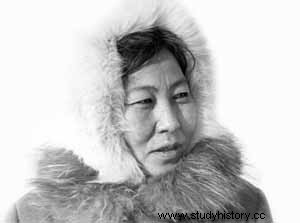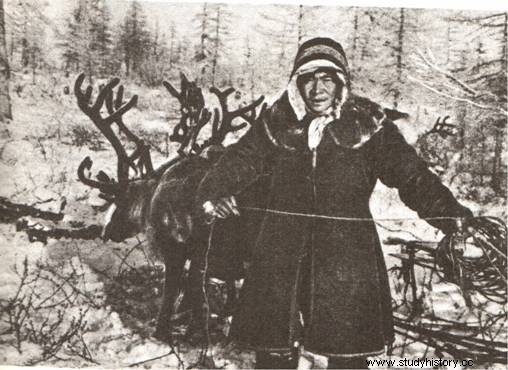Ogdo Aksënova (1936 – 1995) is a Dolgan Russian poet straddling two cultures. As a teacher, she collects the memory and culture of her people and composes songs and poems.
The Dogans
 Ogdo Aksëno was born on February 8, 1936 in Boganida, in the Dolgano-Nénètese district of Taimyr, in the north of the Russia and at the time in the USSR. A member of a nomadic people, the Dolganes, she grew up in a family of reindeer herders.
Ogdo Aksëno was born on February 8, 1936 in Boganida, in the Dolgano-Nénètese district of Taimyr, in the north of the Russia and at the time in the USSR. A member of a nomadic people, the Dolganes, she grew up in a family of reindeer herders.
"Little people of the north", the Dolgans number 7,261 according to the 2002 Russian census. Settled in northern Siberia, beyond the Arctic Circle, they come from Evenk and Yakut groups, as well as descendants of Russian settlers. Nomadic or semi-nomadic, the Dolgan live from fishing and hunting, as well as reindeer herding; they have a strong relationship with their natural environment. Belonging to the Turkish language family, Dolgan has no writing; it is through orality that culture, songs and myths are transmitted from generation to generation.
During the Soviet period, from the beginning of the 1930s, the Dolganes were forced to settle and work in kolkhozes, and saw their culture and their language threatened; the Dolgan language will thus be banned in schools. The two companies clash. Ogdo was born and grew up in this context of sovietization of the traditional society of his people and standardization of lifestyles, which the Second World War accelerated.

Guardian of the culture of her people
Ogdo Aksënova was educated at the boarding school in Noril'sk, where she learned Russian, reading and writing, but also literature. She is immediately seduced by the world of words. From secondary school, it was in Russian that she wrote her first prose stories and her first poems; she notably evokes the transformations of society that she has witnessed, such as the arrival of tractors in 1953:“a caravan of roaring and luminous sleighs. »
Ogdo becomes a teacher and librarian and runs a Čum rouge (red tent), a relay of administrative power installed on the routes taken by the nomads. In the 1960s, she studied at the Maxim Gorky Institute of Literature in Moscow.
A lover of the Russian language, Ogdo is no less attached to the culture of her people. From village to village, she collects legends, tales, myths, traditional songs so as not to see them disappear or blend into the dominant culture. While the Dolgan has no writing, Ogdo published in 1973 the bilingual collection Baraksan , compiling poems, proverbs, riddles in Russian and Dolgan. For this work, she uses the bases of a spelling developed by the linguist Vladimir Nadeljaev, creating a first written culture for her people. It also publishes a Dolgan primer and a bilingual dictionary of some 4,000 words.
Ogdo Aksënova died in February 1995, after founding Dolgan literature and building bridges between two worlds.
